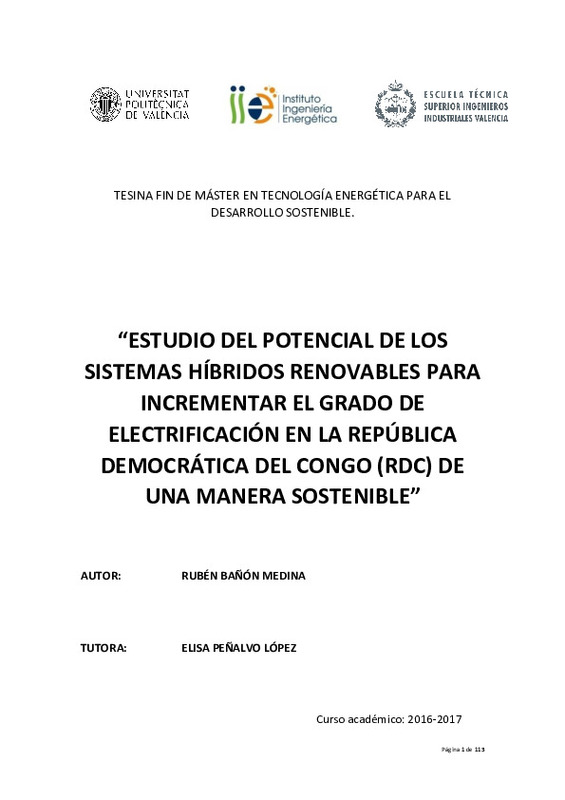|
Resumen:
|
This thesis deals with the current energy situation of the Democratic Republic of Congo, identifying the energy deficiencies present in the country and lack of access to electricity by the population. In this way, the ...[+]
This thesis deals with the current energy situation of the Democratic Republic of Congo, identifying the energy deficiencies present in the country and lack of access to electricity by the population. In this way, the energy situation in each of the regions and renewable energy opportunities in each of the regions is identified.
A Business As Usual scenario is made to see the future energy situation of the RDC without realizing measures in line with sustainable development and access to electricity, compared to a Sustainable scenario in which electrification rate is increased based on renewable generation.
Once the energy opportunities of each region have been identified, configurations of renewable hybrid systems have been analyzed as potential solutions for rural electrification in RDC. Subsequently there have been several energy simulations of renewable hybrid systems with different technologies that are in line with the energy opportunities of each region as well as their type of economic activity.
Different simulations are compared analyzing the data obtained and seeing which is the best configuration for each situation and each region, thus laying the basis for the energy development of these regions based on increasing its electrification rate.
Finally, a sensitivity analysis will be performed to see how different variables affect the simulated hybrid systems and to observe to what extent they can be reliable.
In conclusion it will be showm how renewable hybrid systems are a reliable option for a sustainable development analyzing several alternatives.
[-]
El presente trabajo trata la situación energética actual de la República democrática del Congo, identificándose las deficiencias energéticas presentes en el país y falta de acceso a la electricidad por parte de la población, ...[+]
El presente trabajo trata la situación energética actual de la República democrática del Congo, identificándose las deficiencias energéticas presentes en el país y falta de acceso a la electricidad por parte de la población, analizando además la situación energética en cada una de las regiones y oportunidades energéticas renovables en cada una de las mismas.
Se realiza un escenario tendencial en el que se muestra la situación energética futura de la RDC sin realizar medidas acordes a un desarrollo sostenible y de acceso a la electricidad, comparándose con un escenario futuro en el que se contemplen medidas de electrificación y generación de electricidad basada en energías renovables en el país.
Una vez identificadas las oportunidades energéticas de cada región se han identificado los sistemas híbridos renovables como potenciales soluciones de acceso a la electricidad para la mayoría de las regiones rurales de la RDC, que todavía no cuentan con redes de electrificación. Posteriormente se realizan simulaciones energéticas de sistemas híbridos renovables con distintas tecnologías que se encuentran en consonancia con las oportunidades energéticas de cada región así como tipo de actividad económica de la zona.
Se ha comparan las distintas simulaciones analizándose los datos obtenidos y viendo cual es la mejor configuración para cada situación y cada región, sentando así las bases para el desarrollo energético de estas regiones y el acceso a la electricidad de las mismas.
Finalmente se realiza un análisis de sensibilidad para ver cómo afectan distintas variables a los sistemas híbridos simulados y observar hasta qué punto pueden ser fiables.
En conclusión se mostrará como los sistemas híbridos renovables son una opción fiable para el desarrollo y se realiza la simulación de varios.
[-]
|







